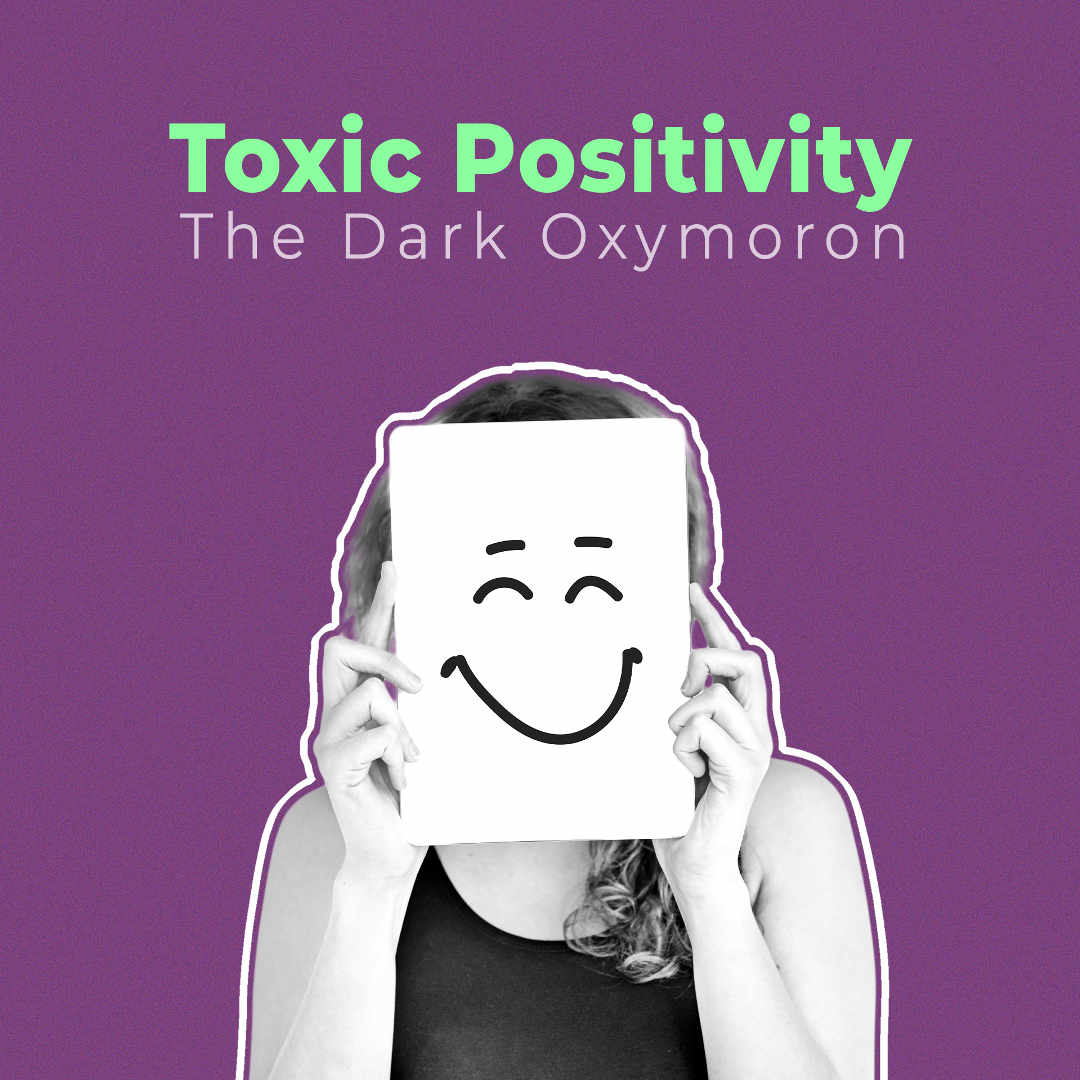Excess Positivity Is Toxic
I’m sure you’ve heard others tell you to put on a smiling face. “Be positive,” “everything will be alright,” etc, are the phrases they tell you when you’re in your lowest mood. Often, their intentions are not incorrect. They feel inclined to hype you with these comments, but this is not the best method either. When someone tells you the aforementioned phrases, they sort of disregard your negative emotions. These phrases tend to push you to keep your emotions hidden, which is detrimental to your emotional well-being.

Definition of the Oxymoron
Toxic positivity, as the name implies, is an oxymoron (a figure of speech with two words contradicting each other). It is a rather dark one. Aside from being a literary construct, this stage of psychological development has practical repercussions. It refers to ignoring, avoiding, suppressing, and invalidating one’s negative emotions and experiences. This is accomplished by forcing people to have a cheerful attitude regardless of how difficult their experiences have been.
The Right Optimism
It is fair and understandable to be optimistic in life or to set aside bad emotions temporarily. Finding a positive lesson from every negative experience is an excellent habit. However, in that rush, hiding your dissatisfaction, grief, or fear might have the most negative consequences. Allowing people and yourself to invalidate your emotions is unhealthy for your heart and mind. It is a subconscious act, often motivated by well-intentioned encouragement, yet it can have adverse consequences, causing more harm.

Stop Dismissing Sentiments
Dismissing your sentiments about a certain incident as a means of moving on is not the solution. We must feel, embrace, and understand the bitterness of terrible happenings to move on from them. If we avoid dealing with our emotions, they begin to reside deep within us and trigger us frequently. Stay positive about your wishes, and future, not necessarily about what has happened in the past. The more you disregard your anguish and emotions from the past, the less you will learn from them. Otherwise, you are more likely to repeat the same mistakes or encounter similar scenarios again.
The Need to Feel
The need to feel is genuine and sensible. People are sometimes embarrassed to express their emotions. It is because they do not want to appear “lame” or “weak” and confirm the world’s opinions. As a result, they often adhere to toxic positivity.
Express Honest Feelings
“I’m fine,” “It’s not a big deal,” and other such expressions are used by people even when they are terribly distressed. The worst advice is to tell individuals to smile regardless of how awful their experiences have been. Doing so provides an illusion that their emotions are exaggerated and can be easily handled. It makes people feel guilty of how they honestly feel about what they have endured, so they hide their emotions.
Gaslighting and Toxic Positivity
Gaslighting is a type of psychological manipulation that causes people to doubt their beliefs and comprehension of events. It is sometimes closely associated with positive toxicity. Gaslighters persuade others to convince them that their impressions are exaggerated. When in actuality, they have little idea what the other person has gone through. This causes one to question their thoughts in a vulnerable state, dismissing real emotions and succumbing to toxic positivity.
Effects on Health
Constantly suppressing your emotions can result in both mental and physical illness.
Wrecked Mental Well-Being
Toxic optimism has a significant and long-term impact on a person’s mental health, leading to anxiety, depression, guilt, and trauma. They foster a strong belief that the urge to feel is unnecessary, and that those who do so are weak. This thinking damages not just them, but also those around them. They become emotionally unavailable to themselves and others after a period of consistent toxicity in the name of positivity.

We need to express our uncomfortable feelings. If we ignore them, they remain deep inside our consciousness, preventing us from healing. It has a substantial effect on our mental health.
Impact on Physical Health
Invalidating and concealing emotions also reinforces the notion that crying is shameful. It fuels stereotypical notions about crying. Breakdowns are needed after disturbing experiences. When we try to prevent breakdowns and keep it all in, it affects our physical health as well. One becomes more susceptible to food disorders and bad lifestyle choices. This causes physical weakness, dark circles, inconsistent sleep habits, and other health issues caused by bad mental health.
These are all signs of unhealthy coping mechanisms.
Your Awareness Matters
Toxic positivity is not discussed often. Awareness of this is important to build a healthy environment in society. It is prevalent in almost every component of society and is barely addressed. At home, schools, and workplaces, toxic positivity is there everywhere. You need to be cautious of your words and actions.
Mindful Actions
As previously stated, toxic positivity is frequently unintentionally created as a result of our good intentions. It’s usually because you want a person to move on and recover from their traumatic history. However, telling them the appropriate phrases is what makes the biggest effect. You should employ language that does not make someone who is suffering appear humiliated, guilty, inappropriate, or too analytical.
For instance, do not say:
- “You will heal soon,” alternatively use, “It is okay to take your time.”
- “Go out with friends; you’ll feel better.” Instead, say, “It is fine to take space.”
- “It’s not a big deal,” Instead say, “I am so sorry you had to go through this.”
- “Do not cry,” but rather say, “I’m there for you, and I’m all ears.”

Practice Self-Love
Self-love is an efficient way to deal with toxic positivity. It motivates you to validate and understand yourself, even when you are in a vulnerable state. No one can understand your circumstances better than you. It allows you to feel difficult emotions, initiate uncomfortable conversations, and reflect on your experiences.
Self-understanding helps us deal with criticism, toxic positivity, and gaslighting correctly. It teaches us how to react to harsh comments and discouraging words. It helps us set our boundaries. We start staying away from people who are not contributing to our mental well-being.
Reach Out to the Right People
Always reach out to the appropriate individuals. Often, in the most trying times, we become more vulnerable to toxic people. We need to establish limits and find a good confidante or friend. It is always advisable to use mental health services and seek the assistance of therapists. If none of these options are available or feasible, you can always journal your feelings. Writing them down helps to reduce stress and anxiety.

It is crucial to recognize that terrible experiences are a part of life and are sometimes unavoidable. It’s alright to make mistakes and incorrect choices since this is how you will learn and grow as an individual. There is no shame in feeling the way you do. Face your harsh feelings rather than avoiding or ignoring them
Conclusion:
Toxic positivity is a dark oxymoron. Be mindful of the statements you make, even if you have good intentions. Our casual and subconscious mistakes might have a harmful impact on someone’s mental and physical well-being.


